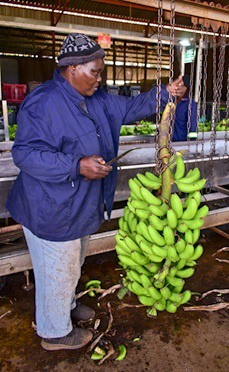 © Carolize Jansen | FreshPlaza.comIf you buy a banana around Thohoyandou, regional capital in the far North of South Africa, chances are that it is grown at Tshivhase Agridam farm in Khubvi, north of the city.
© Carolize Jansen | FreshPlaza.comIf you buy a banana around Thohoyandou, regional capital in the far North of South Africa, chances are that it is grown at Tshivhase Agridam farm in Khubvi, north of the city.
Twenty-four years ago Phillip Mulaudzi advised the new owners of the farm, where formerly coffee was grown, to make a 180 degree turn towards subtropical fruit production which excel on the moist southern slopes of the Soutpansberg. "The bananas grown here are more delicious than elsewhere," the general manager states, adding that macadamia nuts, avocado and litchi fruits flourish in their climate.
But you can forget about growing tomatoes here, he explains: on the farm, they clock an average of 1,800mm of rainfall a year. "We have plenty of water here. When people talk about drought, we talk about blessings of water." The farm is owned by the royal couple His Majesty MPK Tshivhase, Chief ME Tshivhase, and Mrs Miriam Tshivhase of the Tshivhase Traditional Council, privately bought from the Damani Coffee Estate, part of the erstwhile Sapekoe tea and coffee enterprise.
The farm is nestled among the verdant homesteads of Khubvi village where most everyone keeps a home garden. It focuses on bananas, litchis, avocado, and macadamias, with the aid of a permanent staff component of 54, supplemented by forty more during peak harvests and other field operational activities.
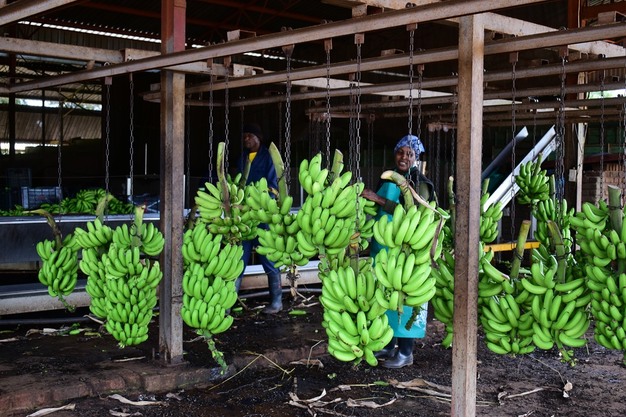 © Carolize Jansen | FreshPlaza.comVenda bananas grown on Tshivhase Agridam Farm, Khubvi
© Carolize Jansen | FreshPlaza.comVenda bananas grown on Tshivhase Agridam Farm, Khubvi
Every November to December the litchi crop from Tshivhase Agridam's four hectares of litchi trees is eagerly awaited by buyers who repack it into two kilogram boxes and take it to Gauteng.
The macadamias grown on eight hectares are delivered to two agroprocessing facilities in Levubu, Royal Macadamia and Green Farms Nut Company, before it is exported. The main markets for their macadamia nuts are China and Europe. "This year we expect to harvest 28 tonnes of nuts In shell,: he says.
But what they are really hitching their wagon to is avocados, intending an expansion of Fuerte, Maluma Hass types and Pinkertons across 130 hectares, on top of the current 35 hectares, in partnership with Allesbeste Boerdery's Ernst family.
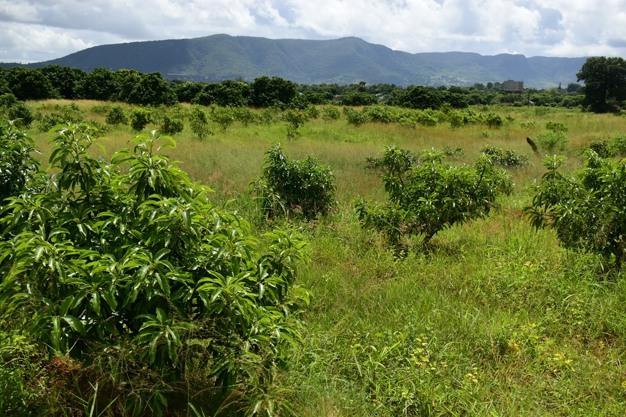 © Carolize Jansen | FreshPlaza.comBig avocado expansion on the cards
© Carolize Jansen | FreshPlaza.comBig avocado expansion on the cards
It's a coming home of sorts to the Ernst brothers: right around here, their father, well-known nurseryman Dr André Ernst, collected the chance seedling that led to the Maluma avocado cultivar.
"Venda hits the earlier market: here, you're two to three weeks earlier, and there's a huge benefit to that," Zander Ernst told visitors at Tshivhase Agridam Farm during a recent Fruit South Africa/Subtrop showcase. "We can push it even three to four weeks earlier, and that's ideal."
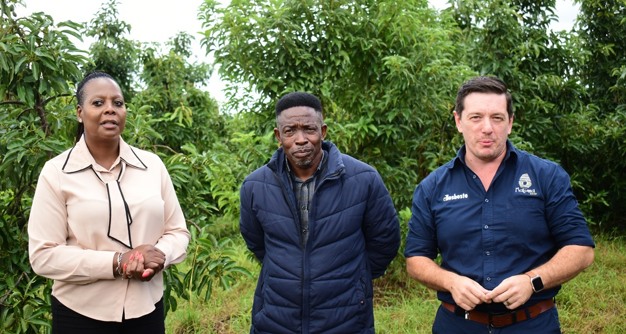 © Carolize Jansen | FreshPlaza.comShertina Maremane, head of the Land Bank in Limpopo, with Phillip Mulaudzi, general manager of Tshivhase Agridam Farm, and Zander Ernst, director of marketing & production at Allesbeste Boerdery
© Carolize Jansen | FreshPlaza.comShertina Maremane, head of the Land Bank in Limpopo, with Phillip Mulaudzi, general manager of Tshivhase Agridam Farm, and Zander Ernst, director of marketing & production at Allesbeste Boerdery
Banana packaging costs pose a barrier to market entry
Tshivhase Agridam Farm's banana clients bring along their packaging materials (18kg crates) to be packed with their fruit orders. The annual banana crop is 2,700 tonnes, a yield which Mulaudzi doesn't hesitate to call only "average". They are little by little re-establishing blocks with new suckers of Williams and Nandi cultivars to increase the vigour of the banana plantings.
There are three cold/ripening rooms to store and ripen fruits, but the packhouse was originally meant to pack coffee, not fresh fruits, and needs investment to unlock the farm's full potential.
The cost of 18kg banana boxes is keeping the farm off the municipal markets of Gauteng where they used to send until it became too expensive. The returns don't even cover the costs, Mulaudzi explains, especially when the market is fully packed with bananas.
Sixty percent of their banana crop are bought by small-scale buyers (hawkers), who in turn create more jobs as well as supply school feeding schemes, while the balance is sold at Spar stores in Thohoyandou, Sibasa, Nzhelele and Malamulele.
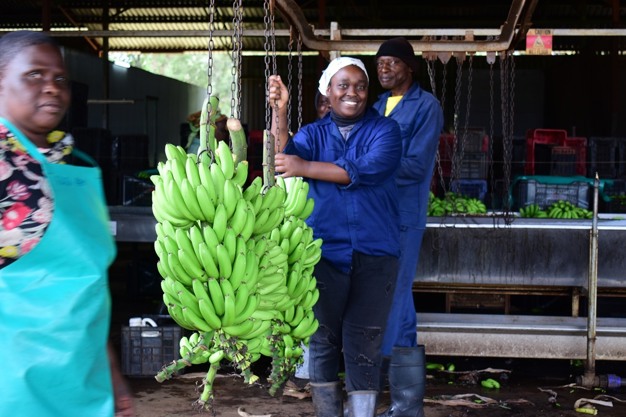 © Carolize Jansen | FreshPlaza.comSixty percent of the bananas grown here are locally consumed
© Carolize Jansen | FreshPlaza.comSixty percent of the bananas grown here are locally consumed
The flexibility of their banana marketing suits them, as it responds to the forces of supply and demand of that particular day.
On the other hand, Mulaudzi points out, supplying bananas to large retailer Shoprite Checkers used to "put a bit of money in our pockets", offering them a higher price than the municipal market price. However, as their banana fields aged, available volumes faltered and the annual banana yield dropped from 35 to 45 tonnes per hectare to the current 18 tonnes per hectare.
"That is why we have started the re-establishment of banana blocks so that we may be able to go back to Shoprite Checkers," he says. "In ten years' time, bananas will still be important to us. Bananas are helping us with the cash flow. By that time, we are going to export avocados because we have a lot of hectares to be established, 130ha. We won't allow ourselves to fall down."
 © Carolize Jansen | FreshPlaza.com
© Carolize Jansen | FreshPlaza.com
For more information:
Phillip Mulaudzi
Tshivhase Agridam Farm
Tel: +27 79 050 7458
Email: zwotheagrib@gmail.com
